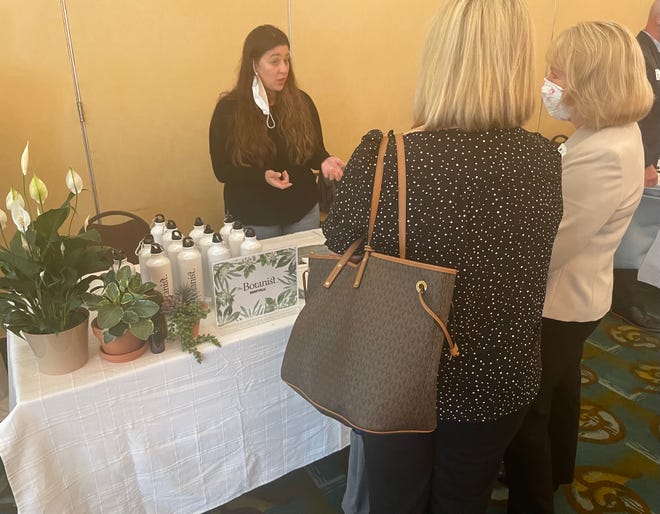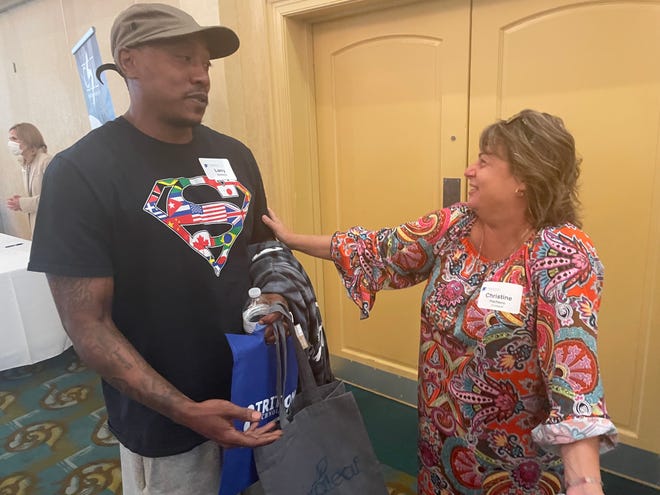
NORWICH — With marijuana currently legal to consume for people 21 and older in Connecticut, and sales of recreational marijuana products to be allowed in 2022, many businesses owners want to know any potential impact to them.
In Norwich Wednesday, the Chamber of Commerce of Eastern Connecticut held their “Business Breakfast and Mini-Expo: The Business of Cannabis” event. Three people spoke, with Connecticut Department of Consumer Protection Commissioner Michelle Seagull gave an overview about the state law, Suisman Shapiro Attorney Kyle Zrenda spoke about legal matters related to legalization, and Kurt Smith, business line manager for Fuss & O’Neil talked about ancillary business opportunities from working with cannabis businesses. Attendees were given an opportunity to ask questions to the speakers after, along with other businesses setting up stands at the talk.

Many of the questions at the talk were directed toward Seagull. People asked her about the licenses required for a marijuana growing or retail business. As Seagull described it, the processes a potential licensee would have to go through starts a lottery to determine which applications will be reviewed, then a second lottery to guarantee an even split between social equity and non-social equity applicants, and then they’d receive a provisional, and eventually a final license.
To be a social equity applicant the business must be 65% owned or controlled by people who are from disproportionately affected census tracts, which historically have a conviction rate for drug offenses greater than one-tenth, or at least 10% unemployment, according to the state. Seagull said there are also residency requirements that are considered.
Pot in Connecticut:CBD, hemp, and medical marijuana businesses see potential in legalization
Among the locations identified by the state as disproportionately affected census tracts are Norwich, New London and Groton.
Niantic resident Larry Jackson said he was concerned about the ability of corporations to claim a license through the social equity committee, as it may mean that he won’t have the kinds of finances to compete with them.
“In writing, I know it says it’s going to be fair and equal, but the money wins,” Jackson said. “It kind of seems like they’re doing it for the people impacted financially instead of the people who went through the bad side.”
Seagull said that it’s possible for a corporation to get a license through a social equity application as a corporation if they are 65% owned or controlled by people who are from disproportionately affected census tracts, but the state’s Social Equity Council will still look at the application like any other.

“The Social Equity Council will need to vet that and see if this is just a large corporation that is trying to circumvent the rules, or is this legitimately a social equity business,” Seagull said.
Jackson said that he is someone who has been affected by and knows others who had been affected by marijuana’s prior illegality and wants things to turn out good for the people from the impacted communities.
“I just want to provide jobs,” Jackson said. “I just want the best out of it.”
Another attendee had asked Seagull about the criterion for social equity. Seagull said it was based on class standing and being from or living in disadvantaged communities, rather than other matters of identity like race, gender or orientation, though Seagull said the Social Equity Committee can suggest changes.
Pot in Norwich:Norwich eyed for retail marijuana sales; concerns over youth use grows after legalization
Christine Pacheco, pharmacy tech for the Groton Curaleaf, a corporately owned dispensary, believes there’s still an opportunity for people to start their own marijuana businesses, despite the expenses.
“People that have the entity to come up with their own money and the background to be able to open their own facility,” Pacheco said.
In terms of the business, Pacheco believes there’s still plenty of growth for both the medical and recreational marijuana business while keeping both distinct for their appropriate uses.
“We keep it separate,” Pacheco said. “We still serve our medical patients to the best of our knowledge, and we open the doors for the recreational part of it.”

